#lady catherine's song is my favorite and I think the darcy songs would be cute for edits
Text
I was really surprised by how much I liked this!
#pride and prejudice: a new musical#jane austen#lady catherine's song is my favorite and I think the darcy songs would be cute for edits
2 notes
·
View notes
Note
WHO HAD A SECRET RELATIONSHIP WITH WHOM?!
@miraculoushedgehog replied to your post: I need this info on 81’ Thomas 😂
In Sense and Sensibility 1981, the servants of Barton cottage are not ones coming with the Dashwoods from Norland; whether sir John sent them or they are just a fixture of the place, the series doesn't tell us, but they do get a grand introduction:
Thomas, who is doing some gardening as he awaits the Dashwoodses, with as much or more enthusiasm as Mr Collins' noticing Lady Catherine's carriage, tells the maid when he sees the carriage:

Darcy cannot fix the hour or the spot? Skill issue. This man certainly can, as he ran inside, put on a coat and proceeded to greet them:
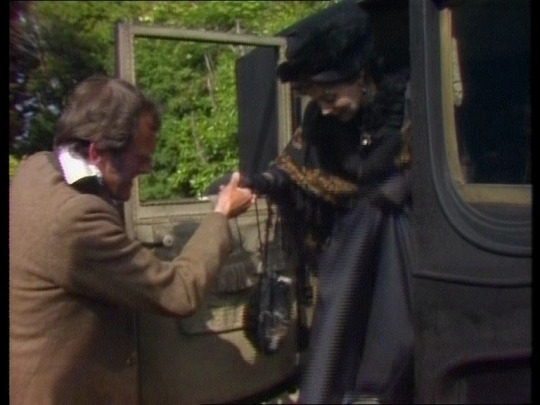
What a meet cute! Ma Dashwood is not at all displeased:
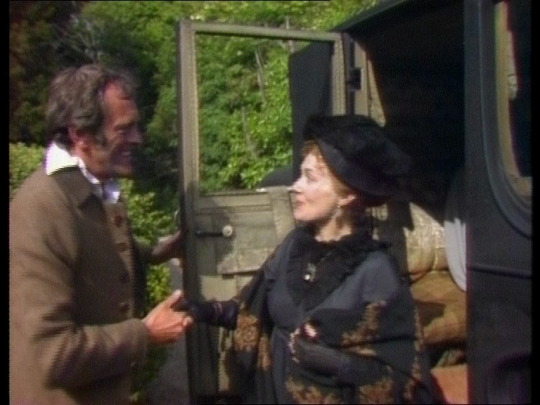
She has not withdrawn her hand! she smiles at him!
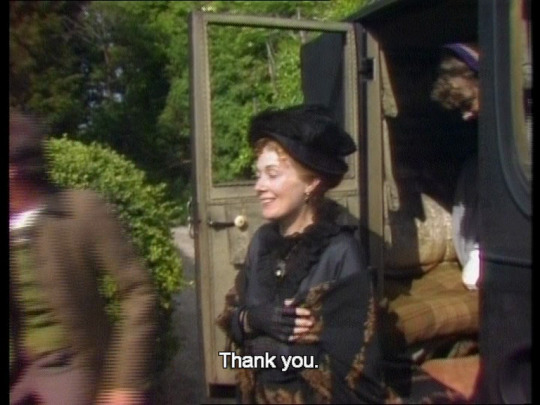
I know who this woman was voting for on that tournament.
Once she moves past him, he pointedly looks at her as she makes her way to the front door, and then adds:

He introduces Susan, and then:

He's taken with her!
You'd say, Scarlet, you are reading too much into this! these are just some perfunctory introductory lines!
Well, you are wrong, because this sequence hasn't ended yet! I'm tempted to think this is the servant character with the most lines in any Austen adaptation. Which reinforces my theory that this is done ON PURPOSE :P
He shows her the different rooms, and then:


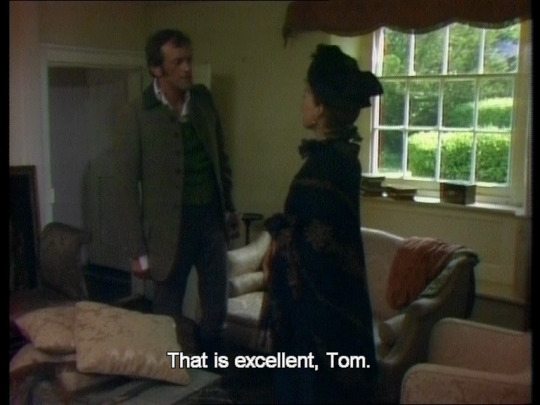
He smiles at her approval, and clearly attempts to prolong their conversation with:
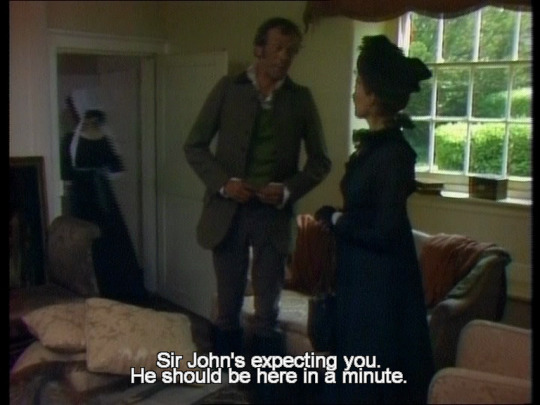

Realizing perhaps this is pushing his luck, as she doesn't answer, he adds:

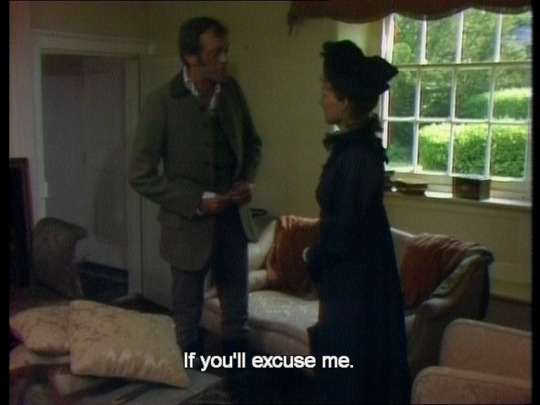
This is not the last time we see him in this very episode, as he comes in to assuage Lady Middleton's fears that her son might be injured, and informing all that only his cucumber frame has been destroyed, showing with that his great presence of mind.
Episode 2. Tom, who introduced himself last episode as doing gardening and odd jobs, has been ascended to doorman:
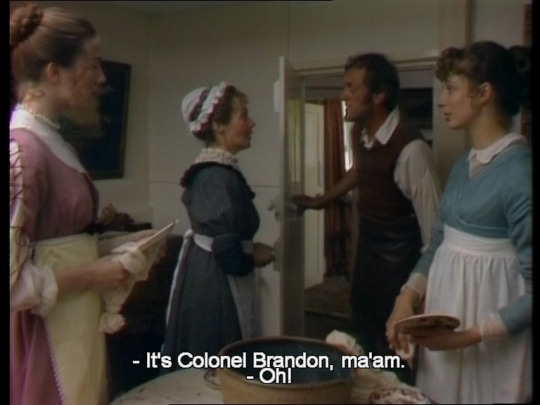
After we meet Willoughby, the same way Andrew Davies treated us to some wet shirt Edward, we are treated to some Tom doing physical labour, clearly highlighting how romance is blossoming in parallel between so similar a mother and a daughter:
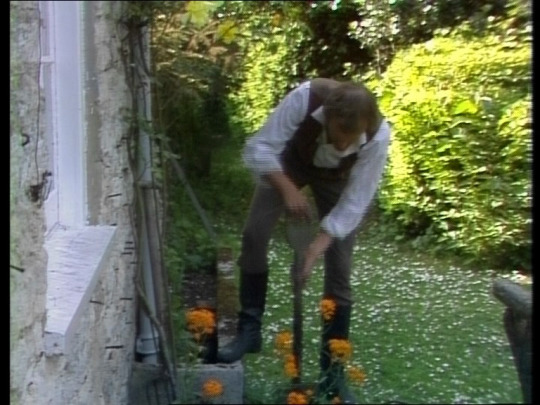
He stops to listen to Marianne and Willoughby sing a song:
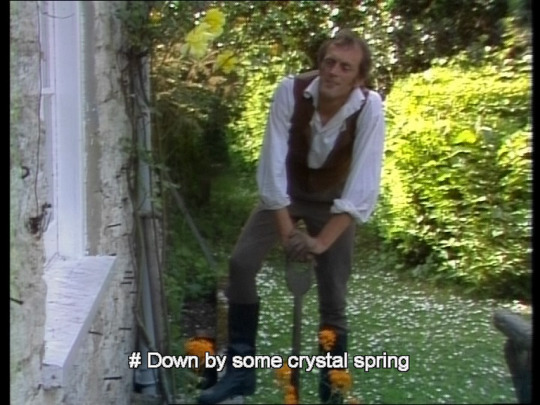
The face of a man in love!
The Queen Maab scene follows this one, and then, as Marianne and Willoughby are singing again another day, what do we see first as background to their singing?
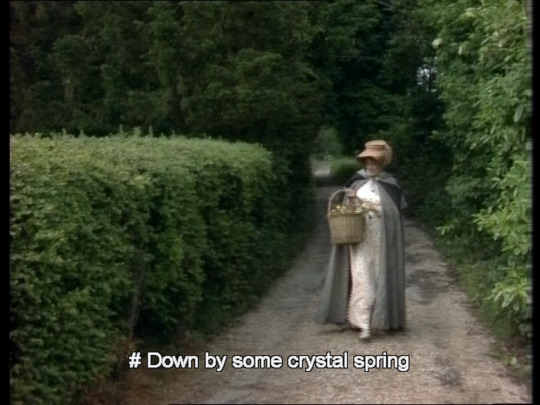
Ma Dashwood! Carrying flowers! This is such an obvious yet subtle romantic parallel. This is the kind of soft romantic storytelling I'm here for.

That's Willoughby's carriage as he's brought back Marianne from Allenham. Would Thomas be complete if he didn't love horses?
Episode 3: We open with some Thomas working in the background:
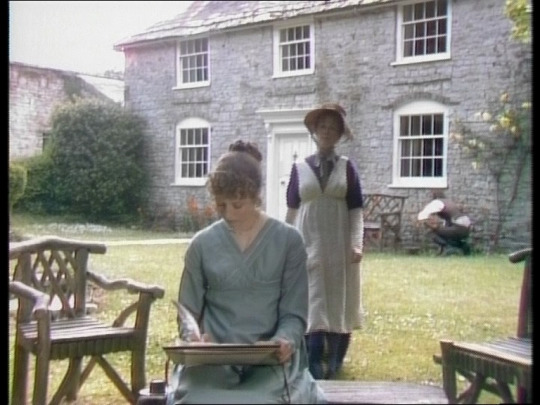
So that we not forget his real relevance in this story's subtext.
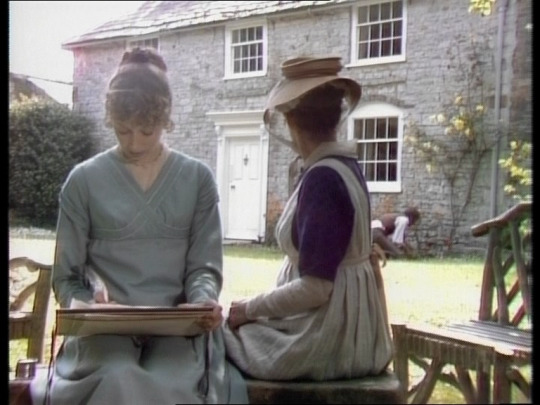
Ma Dashwood not even trying to be subtle.
Another Tom cameo:
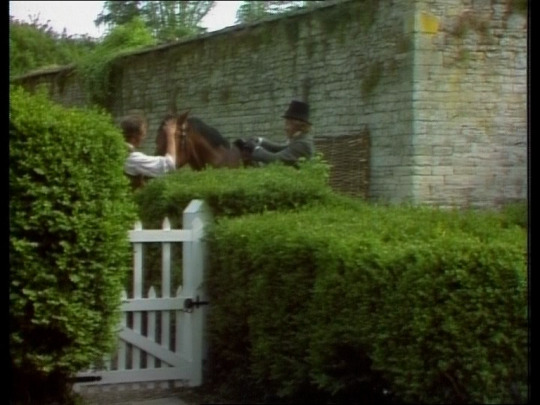
And another:
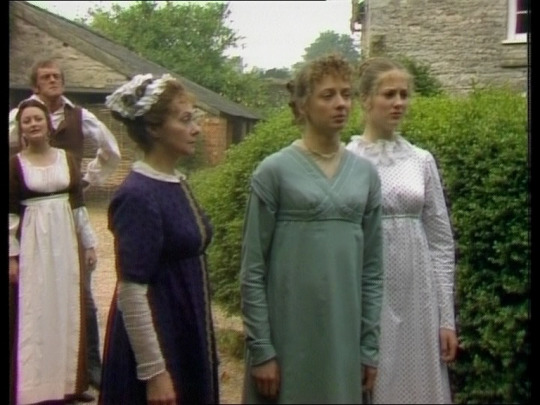
Ma Dashwood's reaction upon hearing that Mrs Jennings has invited Elinor and Marianne to go to London with her:
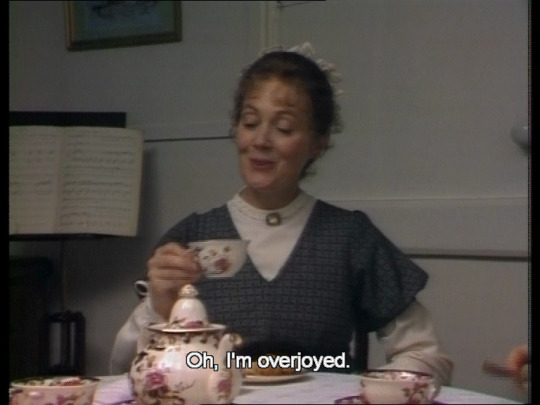
It is worth mentioning that in this adaptation, there's no Margaret. Ma Dashwood is not sick. There's absolutely no reason for her not to be invited, so why didn't Mrs Jennings invite her? Well, of course, because with her nose for romance she's sniffed her secret out! Ma Dashwood does then demolish all Elinor's objections, is truly overjoyed at the idea of being left behind, and explicitly mentions her having Tom and Susan with her as a reason for Elinor and Marianne to go with a clean conscience.
Ma Dashwood's face after her daughters leave the room:
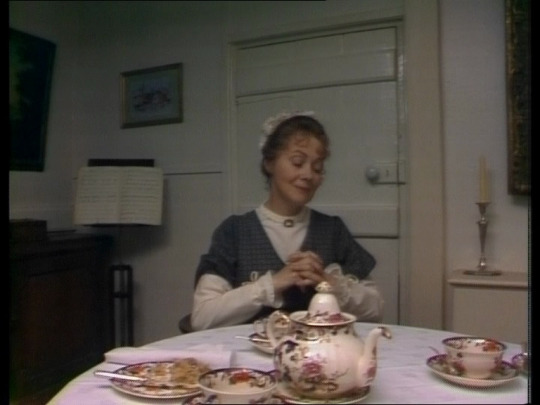
During episodes 4-5, the series of course focuses on our main heroines in London and Cleveland, leaving us to imagine the full blossoming of this romance happening at Barton cottage, and all the angst and heartbreak that their class separation imposes on these middle aged lovers. Ma Dashwood may be a romantic, but she understands that her daughters come first.
As soon as we return to Barton in episode 6, so returns our favorite gardener-doorman-oodjobman Tom! Without seeing him, Ma Dashwood recognizes his way of shutting the front door, and calls his name, and then smiles at his answering:

♪ So this is love... ♫ (notice Elinor drawing Edward's portrait)

(Then we get the "Thomas tells them Mr Ferrars is married" scene)
Then this scene follows:
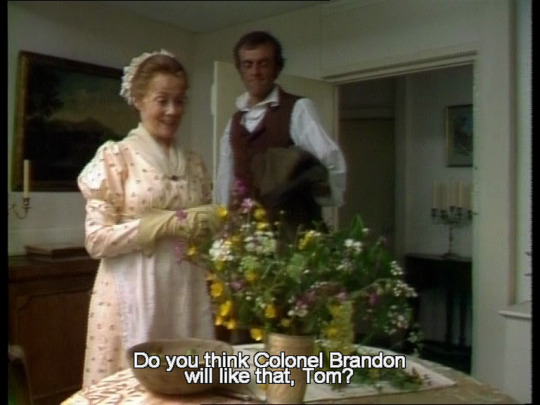

It's a really clever piece of writing, where the writers both show us the grown intimacy, respect and appreciation between them, and give us a nice metaphor, where the flowers of the hedgerow, that represent Tom, are picked by Ma Dashwood, beautiful in her eyes, and made fit for polite society. Alas, the crucial question remains: how can they love be, without ruining Marianne and Elinor's prospects?
As we all know, Edward comes and proposes to Elinor, and marries her. We are then treated to a visit of colonel Brandon, where Ma Dashwood sees how much Marianne's feelings and attitudes towards the colonel have changed.
The last line and frame of the adaptation belongs to Ma Dashwood:
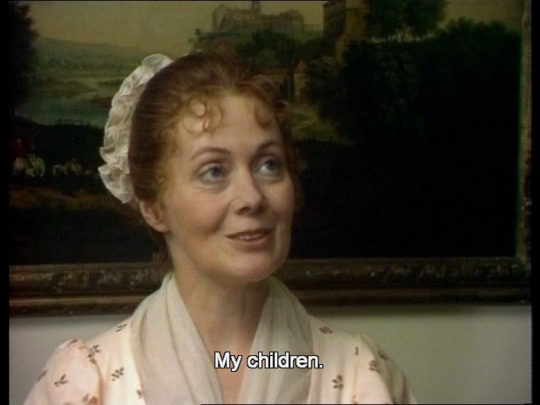
That would, to any distracted viewer, seem very odd. Why that? And why that line? But for the attentive viewer who has been able to piece together the little drama behind the curtains, it's patently clear: she has realized that Marianne will marry Brandon, and once that happens, she will be free to have her own second happily ever after herself, with Tom, the gardener of her heart.
#ask#kajaono#Jane Austen#Sense and Sensibility#Sense and Sensibility 1981#humor#things people are missing out on by not watching the older adaptations :P
44 notes
·
View notes
Text
Impressions of Bride and Prejudice (2004)
I finally watched this movie as it is currently free on YouTube! It's a really interesting "modern-day" adaptation (specifically a Bollywood musical) of Jane Austen's Pride and Prejudice which takes place in Amritsar, India, London, England and California, USA instead of the English countryside. It stars Aishwarya Rai as Elizabeth Bennet (now Lalita Bakshi) and Martin Henderson as Mr. Darcy (William Darcy).
Names:
Bakshis = Bennets
Jaya Bakshi = Jane Bennet
Lalita Bakshi = Elizabeth Bennet
Maya Bakshi = Mary Bennet
Lakhi Bakshi = Lydia Bennet (Kitty isn't included here)
Kholi Saab = Mr. Collins
Balraj = Bingley
Chandra Lamba = Charlotte Lucas
Kiran = Caroline Bingley
Darcy's mother (Catherine Darcy) = Lady Catherine de Bourgh
The Casting:
Aishwarya Rai as Lalita Bakshi. She's captivating and beautiful as Lalita, with intelligence and wits to match. The film understands why Elizabeth Bennet is one of literature's greatest heroines: she has a lot of self-respect, speaks her mind, and refuses to compromise on her values. What's most important is that she achieves the balance between the two clashing cultures: she cares about her family and respects Indian traditions yet is also a strong individual who keeps her dignity.
Martin Henderson as William Darcy. I don't like that Darcy is an American in this movie because (in general) Americans are usually less reserved than British people, so it takes away a key part of Darcy's character (his repressed emotions). He's much more sympathetic than book Darcy because he seems to be more open-minded towards Indian culture the more he learns about it (unlike book Darcy, who is stubborn and insists that his "good opinion once lost is lost forever"). In the book, Darcy's pride has several characteristics (belief in the correctness of his opinions, belief in his social superiority, bad treatment of others he thinks is beneath him). I don't like how the film simplified his pride into imperialism/ethnocentrism, which he lets go of pretty quickly. Plus his "rudeness" can easily be perceived as discomfort in a new cultural environment because he hasn't been exposed to Indian culture, whereas in the book it seems to be intentional (and Darcy acknowledges to Elizabeth that he was taught to treat others beyond his own social circle meanly). Overall I had rather too much sympathy for him because he's too easy to read; he's experiencing a lot of culture shocks which he isn't prepared for, and his imperialistic beliefs (which come from his mother) don't help. One of the reasons book Darcy is interesting is because he's mysterious; his emotions remain hidden and the only sign of his growing love for Elizabeth is his staring at her. This Darcy is just a typical white American boy who is in love with a woman far superior to him in terms of intellect and cultural awareness.
Nitin Ganatra as Kohli Saab. Mr. Collins is one of my favorite cringe characters ever and never fails to disappoint. In this movie, he's an accountant who lives in the Beverly Hills area in Southern California and is very arrogant because he thinks he's a big shot living close to celebrities in a one-of-a-kind colonial home (when in actuality he lives in a cookie-cutter house in a suburb). He peppers his speech with Western slang to show off how "American" (and thus wealthy) he is, yet still clings to outmoded beliefs that women should be submissive housewives. He represents the very worst of Western culture in that he's materialistic and looks down on Indian culture as beneath him. In his quest for riches he has lost his Indian identity and become greedy.
Notable Scenes:
The first dance. Balraj is happy to have fun and show off his awesome dancing skills. Darcy, meanwhile, observes that the mothers are eyeing Balraj for the marriage market and is worried that his friend may be trapped by gold-diggers. He's clearly uncomfortable and out of his element here, so Kiran helps translate the songs for him. It's interesting seeing Kiran as a translator here because it would explain why she's one of the few people Darcy hangs out with; she's a cultural intermediary here to help him acclimate to a strange new environment.
Darcy snubs Lalita. This part in the book where Darcy insults Elizabeth by proclaiming her "tolerable, but not handsome enough to tempt me" is significant in forming Elizabeth's hatred of Darcy. Not only is he impolite in refusing to dance with Elizabeth, he also shames her by criticizing her looks. In the movie, Darcy excuses himself from dancing with Lalita by saying that he's busy preparing for a conference (in this version, he's a rich businessman who operates luxury hotels). I wish they had kept the original insult in because without it, Lalita's dislike of Darcy has less merit. While it was impolite of him to not dance, he did use a proper excuse and didn't insult Lalita, so unlike in the book, it doesn't make sense why she would hate him so intensely after that one meeting.
A Marriage Has Come to Town song. In this song-and-dance number, Lalita and Jaya are preparing for the wedding to Balraj. The whole town is excited for the wedding and Lalita wonders if life for a woman is all about getting married to be a mere wife: "It seems they had nothing in their lives before today / and why are they so happy to give a daughter away."
Darcy and Lalita conversation #1: Lalita points out most Amritsar residents can't afford to stay at Darcy's luxury hotels; Darcy says standards are necessary, justifying the high price. Darcy says he finds arranged marriages strange and "backwards," hinting at an affinity with Lalita as they are both "romantics." Lalita, still thinking that Darcy is attempting to insult Indian culture, says that arranged marriages have evolved and may not be so evil as he thinks it is.
Lalita and Darcy "accomplished woman" scene. So they have the part from the book where they have Darcy's unrealistic list of the characteristics of his perfect woman and then it becomes a culture clash. Lalita says Darcy's whole hotel business is imperialism (the tourists visit without appreciating Indian culture and the jobs created only benefit the well-off). Darcy replies: "But I'm not British" ("American exceptionalism" is just another form of imperialism).
Dinner with Kohli Saab. I love watching all the "Dinner with Mr. Collins" scenes from all Pride and Prejudice adaptations because it reveals Collins' great arrogance in assuming himself to be of greater importance than he is, as well as his bad manners. This movie does not disappoint; Kohli Saab literally eats with his fingers, shoving rice into his mouth while talking at the same time. Meanwhile, he spews out misogynistic views of women, stating that he came to India to find a "traditional" wife who will serve and obey him; after all, there is "no life without wife." He notes that the Indian-American girls have "a conceited sort of independence" (not what he actually said in the movie, this is a quote from the book which really fits here) and that some of the Indian-American girls "have turned into the lesbian." Lalita later recalls that watching Kohli Saab eat is like observing "a Jackson Pollock painting."
"No Life Without Wife" song. An accurate reading of Kholi Saab: he's "crude and loud" and came to find a wife by flashing his "green card, new house, and big cash." The song reveals what a hypocrite he is; he's lonely and pathetic because there is "no life without wife" yet he won't respect his wife as his equal. I love the "Kohliwood" fantasy sequence where Lalita pictures herself unhappily serving Kohli as a submissive wife. After the song ends Lalita imagines herself marrying Wickham in the English countryside before it turns out Darcy is the groom; she runs away from him.
The Cobra dance. Maya shows off her dancing skills in an awkward dance. Kholi criticizes Indians for being "unsophisticated" (what an arrogant person) while Darcy, in a change of heart, praises how highly they value family.
Kholi's proposal. I love how he tries to train himself to power walk because it's trendy and before proposing stretches himself clumsily, knocking over a pot (he definitely isn't husband material). Lalita mocks Kholi's obsession with physical health, pointing out that many people are physically healthy but don't exercise their minds.
Visiting Kiran. Kiran is arrogant and takes the Bakshis over to her fancy apartment where the mother tries and fails to show some cultural knowledge. I find it interesting that the movie made Lalita and Kiran foils of each other. They are both intelligent women who are "multicultural" in that they can navigate both Indian and Western culture, but they use their cultural knowledge in different ways. Kiran uses it to belittle others and demonstrate her own superiority, while Lalita uses it as a means of gaining respect for herself and others.
Darcy ends up on the same airplane flight as Lalita. This is a cute scene where he gives the first class seat to Mrs. Bakshi just so he can sit with Lalita in economy class (he's totally in love with her!).
Kohli Saab's epic house tour. Love how he pays great attention to the jet tubs and the closets.
Meeting Darcy's mom. She's totally ethnocentric and possibly racist. The first thing she asks Lalita is "tell me about India" and she expresses her disappointment at Darcy's decision (because of Lalita, it's so obvious he's in love) not to buy the hotel in India because "everybody has their hand on India these days" (brings to mind spheres of influence/colonialism since the mother sees India as a place to make a profit). Then the mother reveals that she really isn't interested in India and only knows about its stereotypes: "well, with yoga, and spices, and...wonderful Eastern things here there's no point in traveling there anymore." Meanwhile Lalita retorts that "people haven't stopped going to Italy because Pizza Hut's around the corner."
The first proposal. Darcy's conflicted feelings for Lalita are effectively summed up (perhaps better than in the book, where he begins well but ends with a long account of the inferiority of Elizabeth's connections): "he loves her in spite of the fact that he tried to forget about her, he still wants to marry her in spite of the fact that his family (specifically his mom) will disapprove." Unfortunately, the emphasis on the social inferiority of Lalita's family is left out; Darcy doesn't say anything else until Lalita claims that he thinks her family is inferior and blames him for separating Jaya and Balraj. I don't like this because it seems like the separation of Jaya and Balraj was the only reason Elizabeth rejected Darcy. Also Elizabeth's admission that she did try to overlook her prejudice of Darcy doesn't make sense, because only after the first proposal does she do so.
Plot Changes. The major plot points are all included but the "order of events" has changed:
Lalita and Darcy become friends and she meets his family before his disastrous first proposal. There's a montage where they are traveling alone together, visiting the Grand Canyon and sharing a moment on the beach. I don't like this change because Darcy's separating Jane and Bingley wasn't the only reason Elizabeth rejected him, it was because she hated him (arrogant, proud, doesn't treat others nicely). By showing early on that Darcy is a good person, Lalita's prejudice against Darcy makes less sense because she now has a glimpse of Darcy's true character which in the book doesn't happen until the Pemberley visit.
Their early friendship disrupts Darcy's character journey because it reduces the significance of the first proposal to his character development. In the book, he doesn't start to reform himself until Elizabeth tells him that he needs to behave in a "more gentleman-like manner."
The first proposal is the consequence of all the miscommunication and false perceptions affecting Elizabeth and Darcy, and it motivates both characters to change. Elizabeth rightly scolds Darcy for being inconsiderate; he did the proposal for the selfish reason of purging his feelings so that he wouldn't have to suffer anymore and assumed that she would say yes. Elizabeth rejects him because of his rude manners and lack of consideration, and his defensiveness (where he portrays himself as the victim of feelings and implies he's such a good boy for wanting to marry her in spite of her horrid family) doesn't help. After realizing the extent to which Elizabeth hates him, Darcy writes The Letter to set things right, and Elizabeth realizes that she is not the best judge of character. Thus, giving us a fuller picture of Darcy's character and letting him charm Lalita before the first proposal reduces the significance of the event to the plot and character development.
Wickham and Lakhi have a connection early on, making Lakhi's attempted elopement inevitable. Right after the failed first proposal, Lakhi runs off with Wickham and Lalita and Darcy find out about it at the same time that Darcy comes to apologize and tell Lalita that Wickham is bad. I love that Wickham was punished really badly; after Darcy fights him, he gets slapped twice, once by Lalita and the second time by Lakhi. Even better is that Lakhi doesn't end up with Wickham.
Themes
The film uses the culture clash between India (Eastern) and Western cultures to examine what makes a good marriage.
Indian culture as presented by the film is more collectivist ("we" over "I"). It also promotes traditional gender roles, with women expected to be "meek and submissive" wives. In contrast, Western culture in the film is more individualistic and aspirational (careers and love are possible). But at its worst it condones exploitation of others for profit and cultural intolerance.
In the book, there are different kinds of "culture clashes:" traditional nobility versus new money (the Bingleys made their fortune in trade and Caroline is hoping to be an accomplished woman to make up for this), country versus city (Darcy offending Mrs. Bennet by claiming that the society is "confined and unvarying") and arranged versus romantic marriages.
The misunderstandings that propel the story (Darcy's dismissing of Elizabeth as "tolerable," him falling in love with her even though she still hates him, her belief in the legitimacy of "first impressions") are emphasized through the culture clash. Many of the conflicts in the film are a result of cultural stereotypes and conflicting beliefs.
Interestingly the film doesn't resolve the question it raises of how best to appreciate India and its culture. Lalita raises a lot of points about not oversimplifying Indian culture to a few stereotypes, but one could argue that India as represented by the film might be stereotypical. With the exception of the resort scenes and Goa beaches (which are tourist traps according to the film), the scenes in India heavily emphasize the "developing country" aspects of India with lots of pastoral scenes (cows crossing the road unharmed, farmland, dirt, shacks, dirty motorcycles fighting each other in traffic). Plus the "culture" as represented by the film's dance sequences seems to be the dominant Hindu culture with lots of elephants and saris and curry. Yes, I know this film is a romantic comedy, but the assertion that India is a complex, diverse country is contradicted by what we are presented. Presenting the rustic aspects of India would explain why the characters want to get out of India and go to the richer Western nations, but it harms the premise of the story that we shouldn't judge based on first impressions because the India scenes seem to confirm a Westerner's stereotypes of India (exotic people living in a primitive land).
Changing views on marriage: In the film, as in the book, we are presented with traditional and modern views on what makes a good marriage. Mr. Collins' marriage represents the traditional view in which marriage is a practical "economic proposition," much like a business deal where the marriage is made for the securing of material wealth and happiness comes last. Lady Catherine and other members of the aristocracy view marriage as a means of producing heirs (and bringing large amounts of money through dowries) to keep the property (source of power and wealth) in the family. The modern view of marriage is a partnership of equals who love and respect each other; happiness rather than material wealth/power is the priority. It threatens the power of the traditional nobles as it provides the potential for social climbing. Finally, it becomes another part of the culture clash, as it also ties in with the Western value of individualism, putting it at odds with the more collectivist Indian culture as presented by the film.
Elizabeth and Darcy in the book and in the film are united by their belief in a marriage based on love (the modern view). In the film, Darcy says he wants to look forward to starting each day with his wife, while Lalita says she wants a man who is a romantic and respects her for her mind. For instance, Elizabeth states that "only the deepest love will induce me into matrimony" and that Jane and Bingley should have some time to get to know each other before being rushed into marriage. To Elizabeth, mutual love and respect are essential for a marriage to succeed.
As for book Darcy, when Caroline catches him admiring Elizabeth and asks if he will marry her right away, he jokingly rebuffs her for making that assumption: "A lady's imagination is very rapid; it jumps from admiration to love, from love to matrimony in a moment. I knew you would be wishing me joy." Significantly, he mentions love needing to come before marriage, hinting that he shares the same belief about respect (admiration) and love being necessary for a good marriage. In fact, a big reason he separated Jane from Bingley was because he feared that Jane did not love Bingley in return. In short, love in marriage is just as important to Darcy as it is to Elizabeth.
Conclusion:
Bride and Prejudice, as shown by the title, focuses heavily on the theme of marriage and uses the culture clash between India and the West to emphasize the importance of first impressions in our treatment of others.
Even if you aren't into Pride and Prejudice, the movie is worth watching for the Bollywood dance sequences. I also liked the songs because they effectively developed the marriage theme.
The characters are mostly true to the book, except for Darcy, who isn't proud enough and is quick to reform his character.
Last but not least, the real villains of the story were imperialism and ethnocentrism.
Tags: @thatvermilionflycatcher @appleinducedsleep @princesssarisa
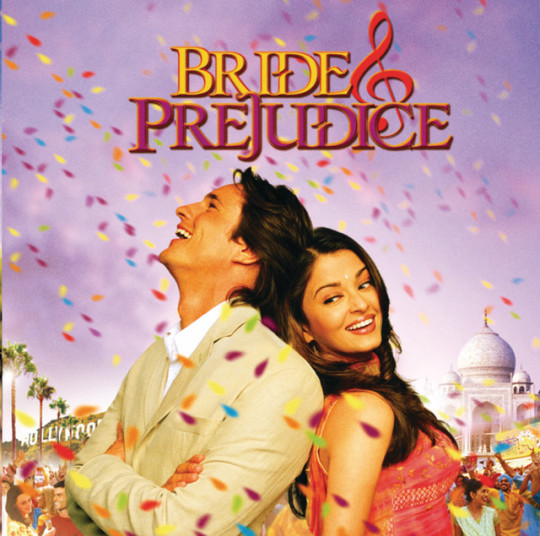
#bride and prejudice#aishwarya rai#martin henderson#bollywood#pride and prejudice#jane austen#mr darcy#elizabeth bennet#elizabeth x darcy#book adaptation#adaptation
86 notes
·
View notes